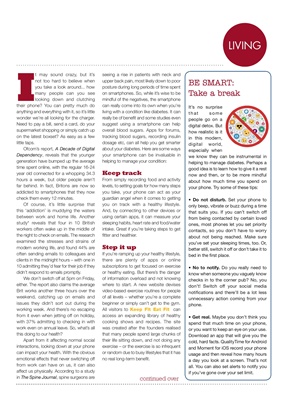
KITLIVING
I
t may sound crazy, but it's
not too hard to believe when
you take a look around... how
many people can you see
looking down and clutching
their phone? You can pretty much do
anything and everything with it, so it's little
wonder we're all looking for the charger.
Need to pay a bill, send a card, do your
supermarket shopping or simply catch up
on the latest boxset? As easy as a few
little taps.
Ofcom's report, A Decade of Digital
Dependency, reveals that the younger
generation have bumped up the average
time spent online, with the regular 16-24
year old connected for a whopping 34.3
hours a week, but older people aren't
far behind. In fact, Britons are now so
addicted to smartphones that they now
check them every 12 minutes.
Of course, it's little surprise that
this 'addiction' is muddying the waters
between work and home life. Another
study* reveals that four in 10 British
workers often wake up in the middle of
the night to check on emails. The research
examined the stresses and strains of
modern working life, and found 44% are
often sending emails to colleagues and
clients in the midnight hours - with one in
10 admitting they'd fear for their job if they
didn't respond to emails promptly.
We don't switch off at 5pm on Friday,
either. The report also claims the average
Brit works another three hours over the
weekend, catching up on emails and
issues they didn't sort out during the
working week. And there's no escaping
from it even when jetting off on holiday,
with 37% admitting to checking in with
work even on annual leave. So, what's all
this doing to our health?
Apart from it affecting normal social
interactions, looking down at your phone
can impact your health. With the obvious
emotional effects that never switching off
from work can have on us, it can also
affect us physically. According to a study
in The Spine Journal, spine surgeons are continued over
BE SMART:
Take a break
It's no surprise
that some
people go on a
digital detox. But
how realistic is it
in this modern,
digital world,
especially when
we know they can be instrumental in
helping to manage diabetes. Perhaps a
good idea is to learn how to give it a rest
now and then, or to be more mindful
about how much time you spend on
your phone. Try some of these tips:
• Do not disturb. Set your phone to
only beep, vibrate or buzz during a time
that suits you. If you can't switch off
from being contacted by certain loved
ones, most phones let you set priority
contacts, so you don't have to worry
about not being reached. Make sure
you've set your sleeping times, too. Or,
better still, switch it off or don't take it to
bed in the first place.
• No to notify. Do you really need to
know when someone you vaguely know
checks in to the corner pub? No, you
don't! Switch off your social media
notifications and there'll be a lot less
unnecessary action coming from your
phone.
• Get real. Maybe you don't think you
spend that much time on your phone,
or you want to keep an eye on your use.
Download an app that will give you the
cold, hard facts. QualityTime for Android
and Moment for iOS record your phone
usage and then reveal how many hours
a day you look at a screen. That's not
all. You can also set alerts to notify you
if you've gone over your set limit.
seeing a rise in patients with neck and
upper back pain, most likely down to poor
posture during long periods of time spent
on smartphones. So, while it's wise to be
mindful of the negatives, the smartphone
can really come into its own when you're
living with a condition like diabetes. It can
really be of benefit and some studies even
suggest using a smartphone can help
overall blood sugars. Apps for forums,
tracking blood sugars, recording insulin
dosage etc, can all help you get smarter
about your diabetes. Here are some ways
your smartphone can be invaluable in
helping to manage your condition:
Keep track
From simply recording food and activity
levels, to setting goals for how many steps
you take, your phone can act as your
guardian angel when it comes to getting
you on track with a healthy lifestyle.
And, by connecting to other devices or
using certain apps, it can measure your
sleeping habits, heart rate and food/water
intake. Great if you're taking steps to get
fitter and healthier.
Step it up
If you're ramping up your healthy lifestyle,
there are plenty of apps or online
subscriptions to get focused on exercise
or healthy eating. But there's the danger
of information overload and not knowing
where to start. A new website, Keep Fit
Eat Fit, devises video-based exercise
routines for people of all levels - whether
you're a complete beginner or simply
can't get to the gym. All visitors to the
website can access an expanding library
of healthy cooking shows and recipes.
The site was created after the founders
realised that many people spend large
chunks of their life sitting down, and not
doing any exercise - or the exercise is so
infrequent or random due to busy lifestyles
that it has no real long-term benefit.